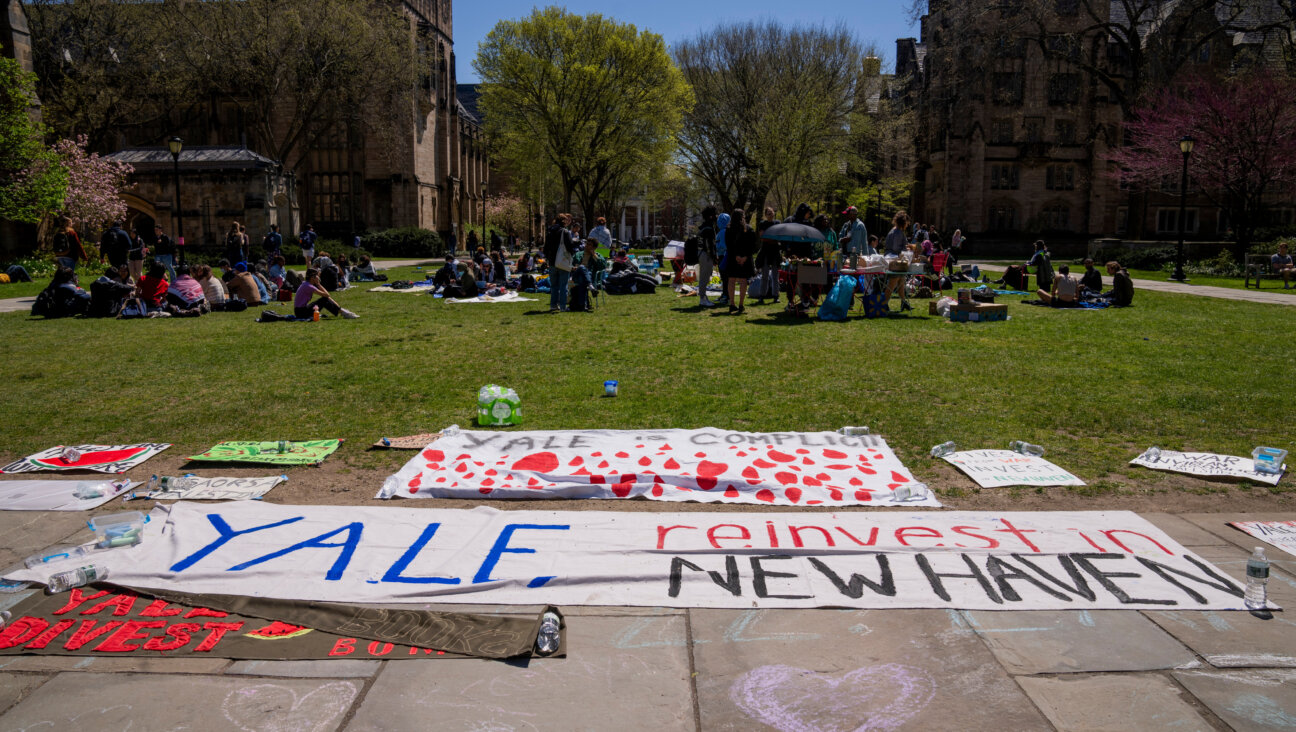In European Elections, Tough Times Drive Voters to Far Right
Gains by anti-Semitic, xenophobic and racist far-right parties in June 4-7 elections for European Parliament were a reminder of how voters across Europe gravitate toward fringe parties and extremists during tough economic times.
As in the United States, Europe is experiencing levels of unemployment not seen since the Great Depression. The financial misery has given rise here to increased nationalism, skewing an election of representatives whose job is mostly to pass Europe-wide regulations on food and safety standards, the environment and internal market competition.
“As far as Jews are concerned, the election results are a warning that in a period of crisis people vote with extremists,” Serge Cwajgenbaum, secretary general of the European Jewish Congress, told JTA from Paris. “It doesn’t matter if it is left or right to angry voters, as long as it is extreme.”
For the first time since the 1930s, a neo-fascist group in Britain, the British National Party, received enough votes to enter a legislative body. Of the two representatives the party will send to the EU Parliament in Brussels, one is Nick Griffin, a convicted Holocaust denier accused of chanting “Death to Jews!” at a 1981 political rally in Leeds.
Krisztina Morvai, the newly elected Hungarian parliamentarian from the far-right Jobbik party, blogged earlier this month in response to accusations of xenophobia, “I would be glad if the so-called proud Hungarian Jews would go back to playing with their tiny little circumcised d—s rather than vilifying me.”
Her party won three seats, marking Jobbik’s first entry into EU politics.
In Austria, far-right parties won 18 percent of the vote, a greater percentage than anywhere else in Europe. One of the parties, the Freedom Party, or FPO, campaigned with posters reading “FPO veto for Turkey and Israel in the EU.” With 13 percent of Austrian votes, the party more than doubled its share in the last European Parliament elections, in 2004.
The ascent of the far right amid record-low turnout of 43 percent of 388 million eligible voters was a message to European institutions that worries over immigration and anger over failed domestic policies take precedence over any pan-European agenda, analysts said.
About 30 of the 736 new European Parliament members come from extreme-right parties in countries such as Hungary, Italy, Britain, the Netherlands, Finland, Romania and Bulgaria – up from 23 in 2004. The strongest showing in the elections was for center-right parties, which took victories across Europe and trounced their Socialist rivals. The centrist conservatives have the largest voting bloc in the Parliament.
But apathy – national voter turnouts in Europe frequently are above 60 percent – and the perception that the vote was for a distant, insignificant legislature may mean that extremists will not do as well in upcoming national elections in individual European countries.
Clara Marina O’Donnell, an analyst at the Centre for European Reform in London, cautioned against interpreting the far-right gains as a major political upheaval.
“We have a growth in certain countries of extreme parties, but they only got a few seats and the growth is very much marginal,” O’Donnell said. “People feel the European Parliament does not count, so they feel more tempted to vote extreme, often electing candidates they would never think of choosing for their national parliaments.”
European institutions in Brussels comprised of country representatives have no unified foreign policy or jurisdiction over crucial national issues, such as immigration, education or health care.
But they occasionally make policy – such as when the European Parliament froze a planned upgrade of EU relations with Israel during Israel’s war against Hamas in Gaza in January. They also may have a hand in setting European rules on shechita, Jewish ritual slaughter, which is banned in some European countries.
More worrying to Jews and other minorities is that extremist parties who gained ground in the recent European vote show no sign of going away.
The Freedom Party, for instance, is already in the Austrian Parliament, with 34 out of 183 seats, and twice has been a junior partner in coalition governments. The possibility that Jobbik will win seats in Hungary’s Parliament in 2010 elections is no longer remote, given that the party captured nearly 15 percent of the vote in Hungary for EU Parliament.
In the Netherlands, the openly anti-Muslim, anti-immigrant Freedom Party – a far-right party that though supportive of Israel has been condemned by European Jewish groups – defeated the mainstream Socialists to finish a close second behind the center-right, with 17 percent of the vote.
“If on the EU level they do not stop this kind of extremism, it will get worse,” Cwajgenbaum said. “There is something wrong with how people are being educated, or not educated, in these countries.”
There are some positive signs, with the far right failing to garner almost any support in Germany, France, the Czech Republic and Poland.
In addition, the new extreme right members of the European Parliament are not expected to have much influence in Brussels because as nationalists, they will have difficulty coming up with a united position – as they demonstrated in their 2004 failure to form a voting bloc.
“Within the European Parliament, there are people who need to be quarantined,” said the Simon Wiesenthal Center’s director for international relations in Paris, Shimon Samuels, “and there are enough centrists who will make sure that happens.”

I hope you appreciated this article. Before you go, I’d like to ask you to please support the Forward’s award-winning journalism this Passover.
In this age of misinformation, our work is needed like never before. We report on the news that matters most to American Jews, driven by truth, not ideology.
At a time when newsrooms are closing or cutting back, the Forward has removed its paywall. That means for the first time in our 126-year history, Forward journalism is free to everyone, everywhere. With an ongoing war, rising antisemitism, and a flood of disinformation that may affect the upcoming election, we believe that free and open access to Jewish journalism is imperative.
Readers like you make it all possible. Right now, we’re in the middle of our Passover Pledge Drive and we still need 300 people to step up and make a gift to sustain our trustworthy, independent journalism.
Make a gift of any size and become a Forward member today. You’ll support our mission to tell the American Jewish story fully and fairly.
— Rachel Fishman Feddersen, Publisher and CEO
Join our mission to tell the Jewish story fully and fairly.
Only 300 more gifts needed by April 30
























